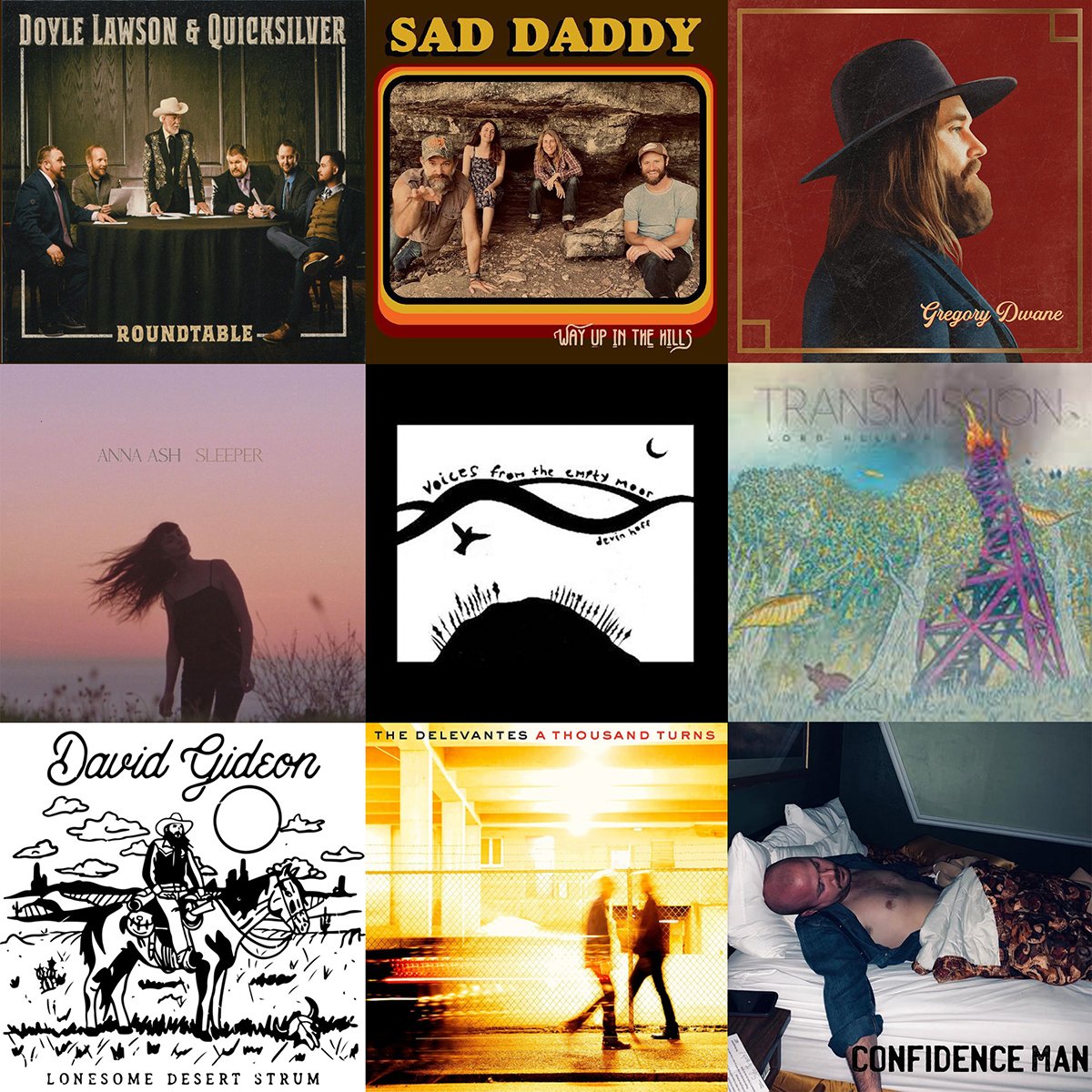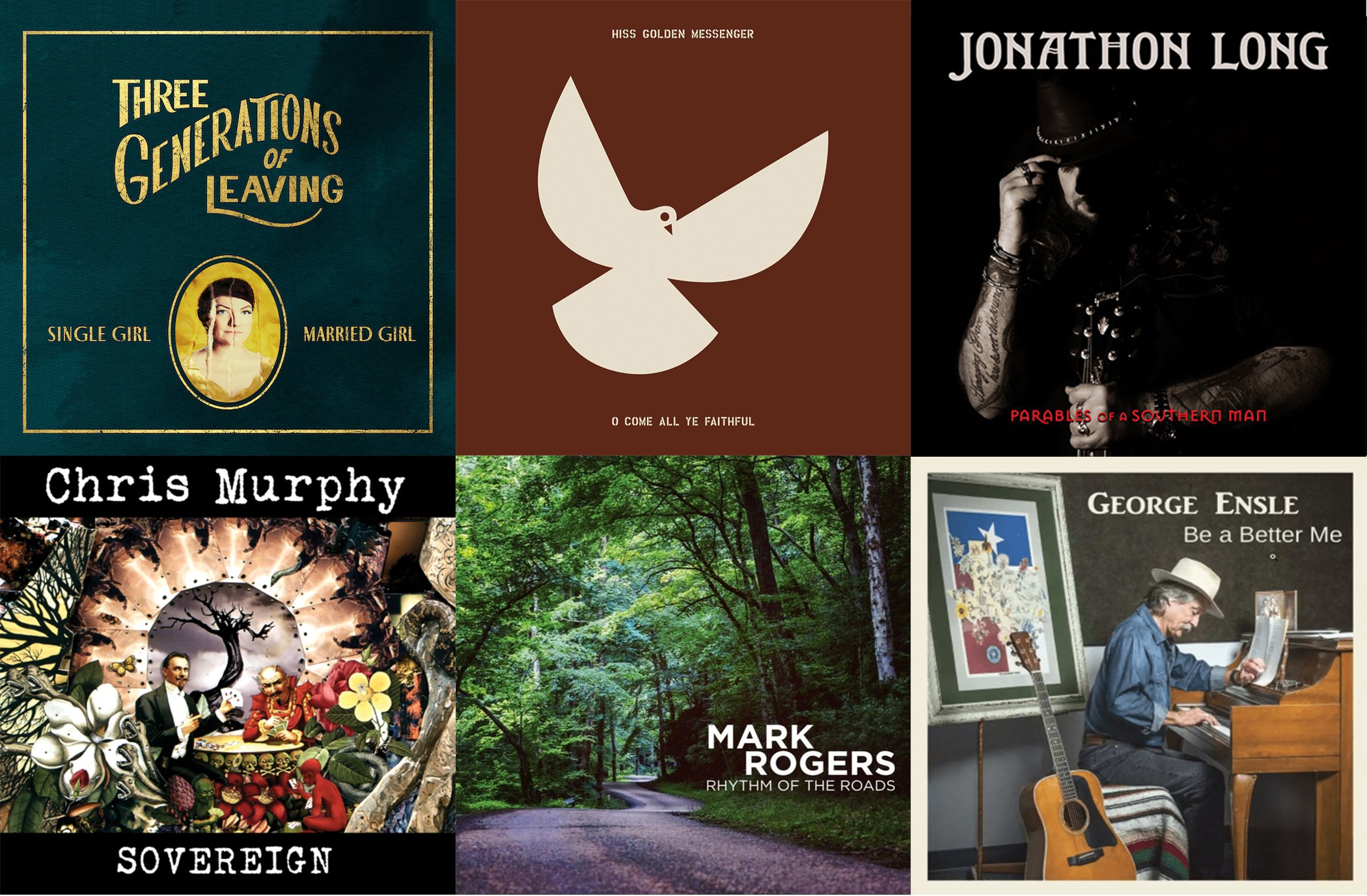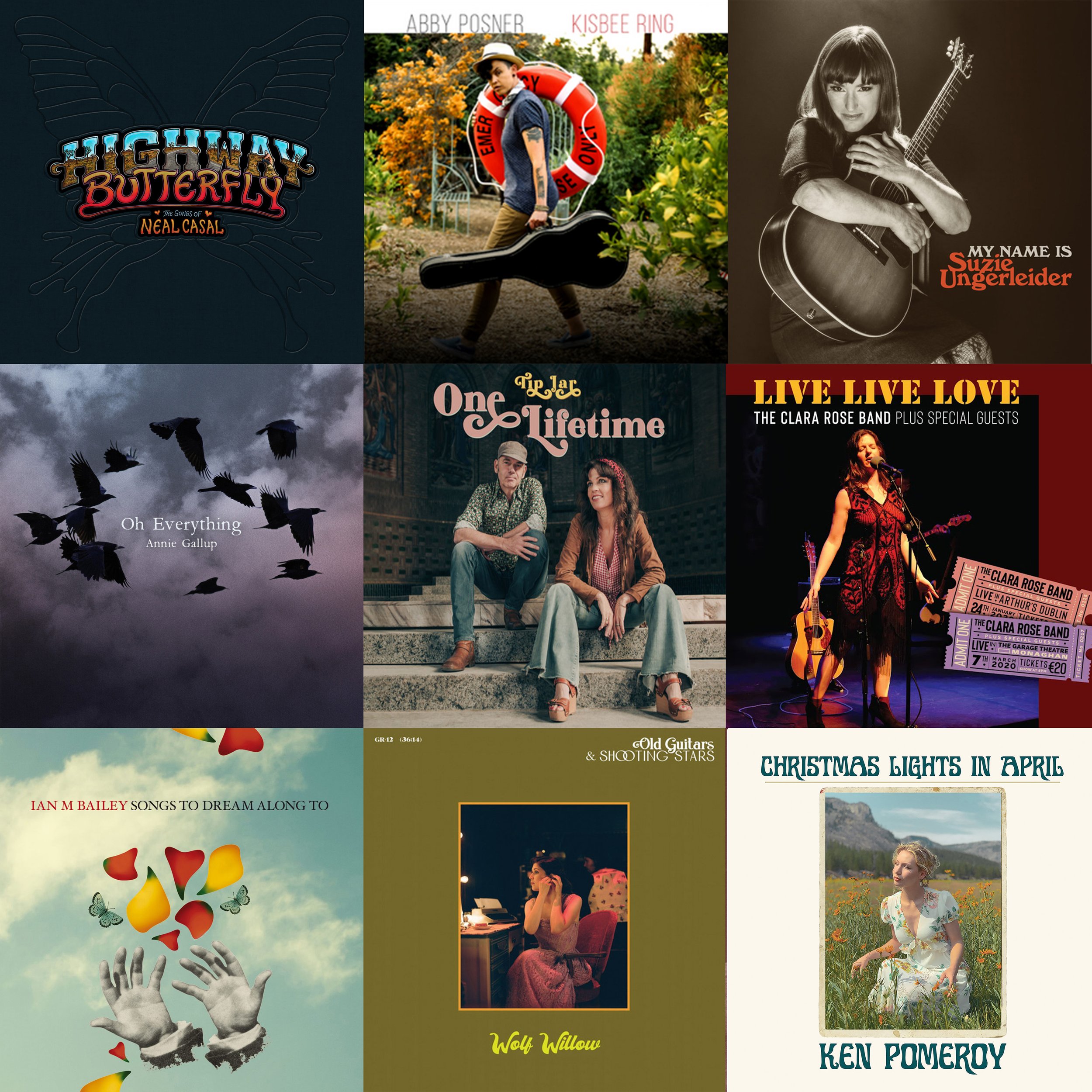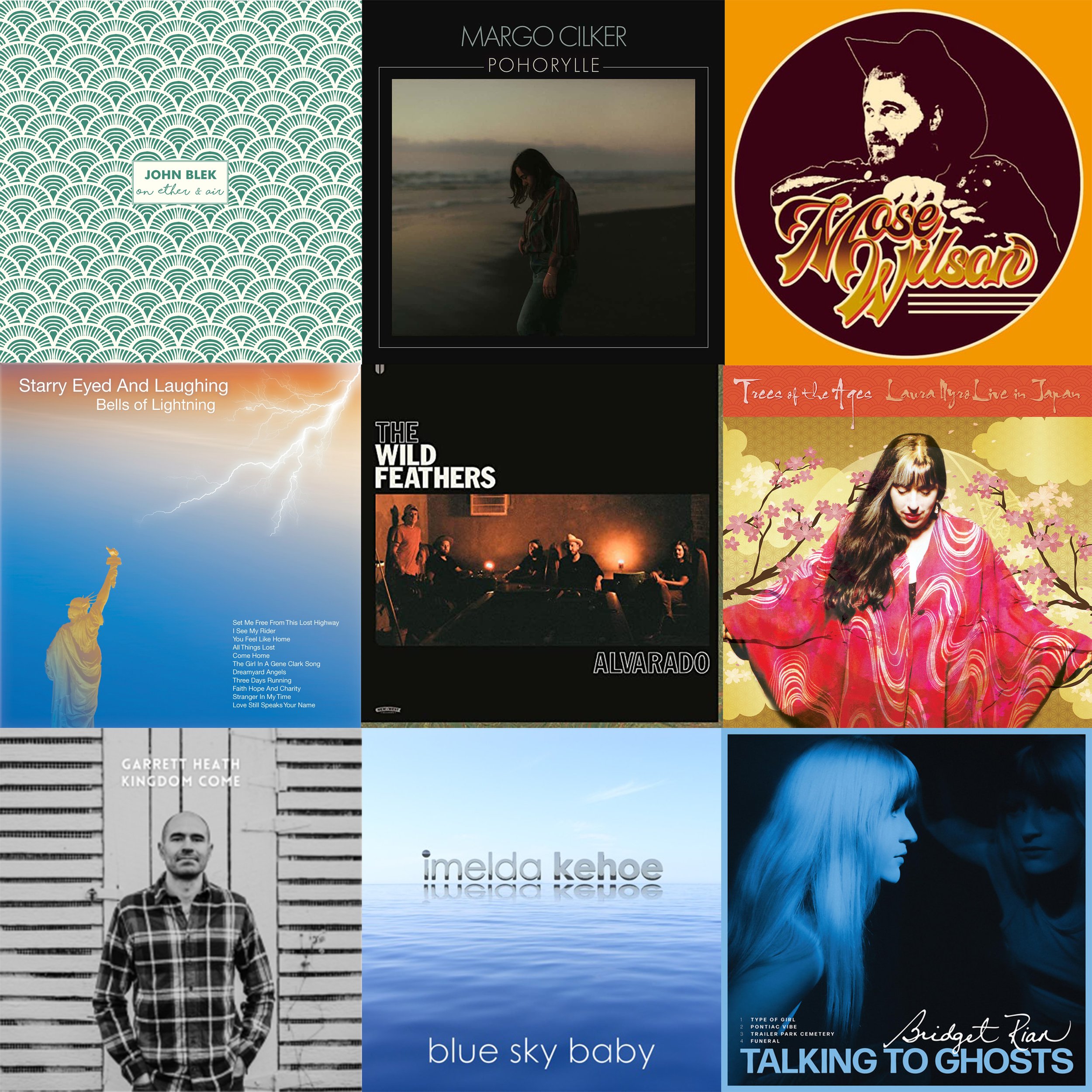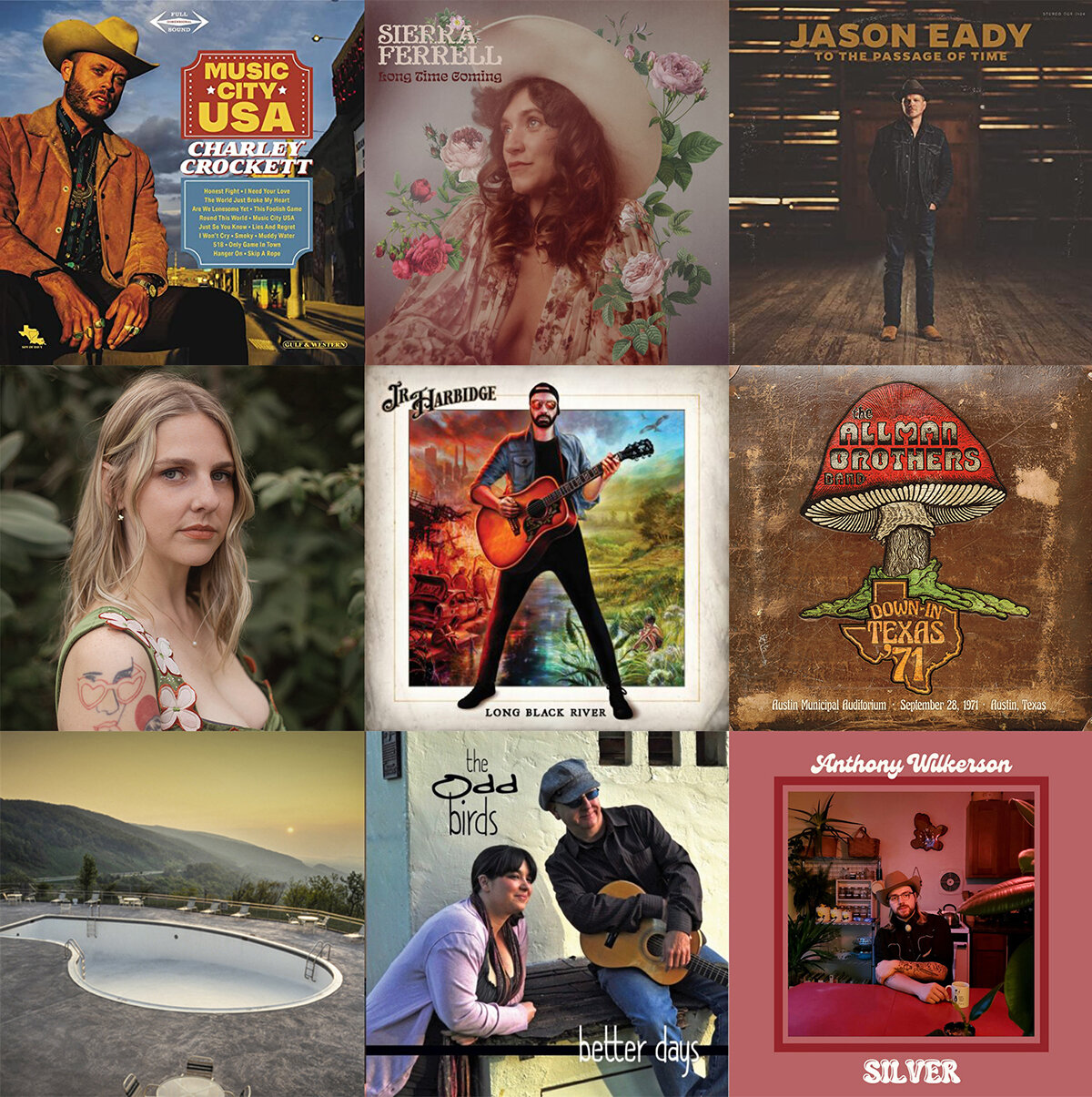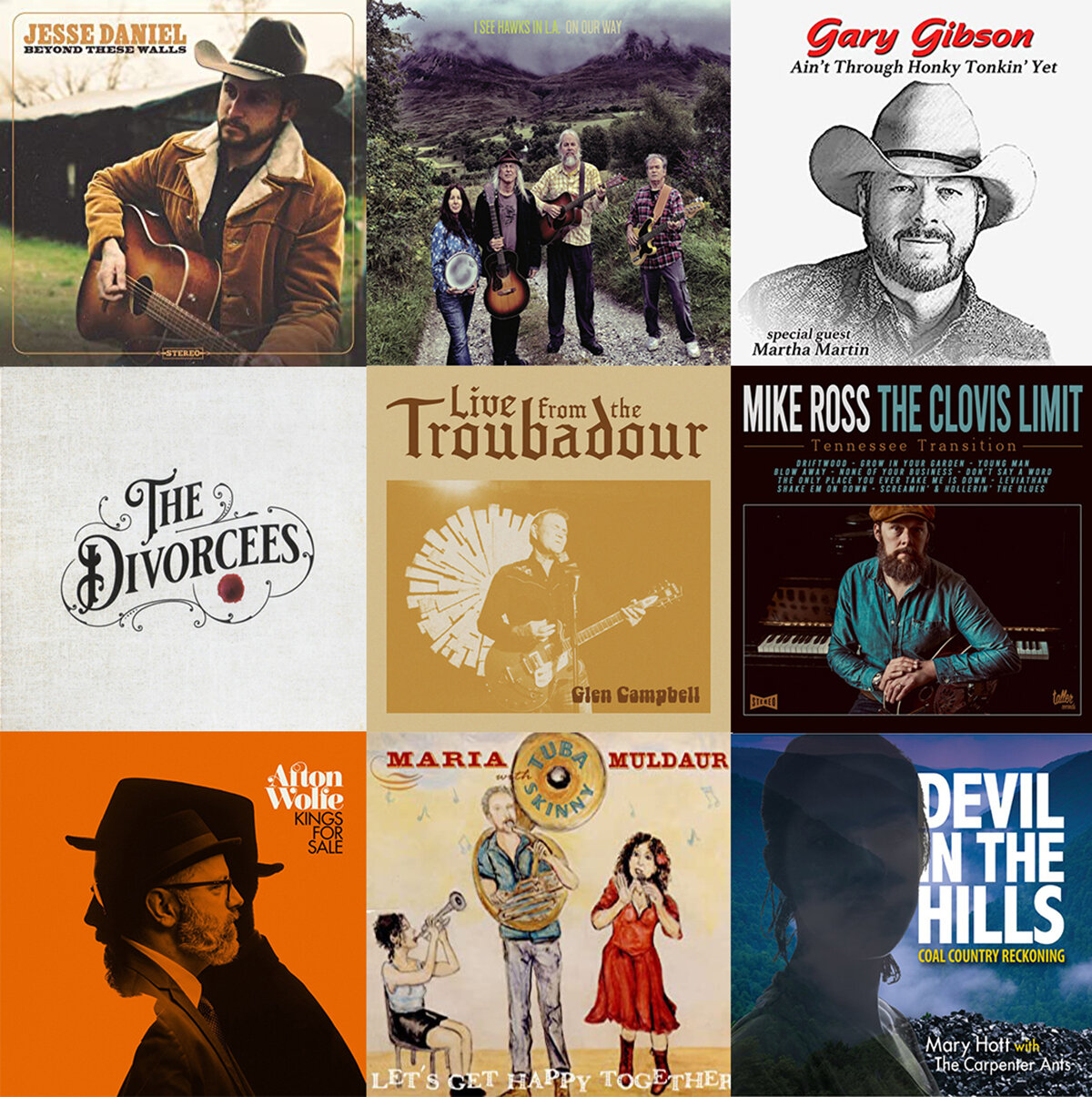Jake Xerxes Fussell Good And Green Again Paradise of Bachelors
North Carolina resident and folk historian Jake Xerxes Fussell continues to explore the music and language of former times on this, his fourth album. GOOD AND GREEN AGAIN is a further deconstruction and recreation of traditional folk songs by Fussell who, for the first time, also includes three self-written instrumental tracks on this album.
Recorded and mixed at Overdub Lane in Durham, North Carolina, the production duties were overseen by label mate James Elkington, who also contributed piano, organ, dobro, mandolin, vibraphone, and guitars. Other musicians that gave a lending hand were Libby Rodenbough on violin, Joe Westerlund on drums, Anna Jacobson on horns, Nathan Golub on pedal steel, Joseph Decosimo on fiddle, and Casey Toll on upright bass. Bonnie Prince Billy also contributes, adding backing vocals on the sprightly anti-war opener Love Farewell. Somewhat more instrumentally experimental than his previous recordings, Fussell introduces horns on Carriebelle and the closing track Washington, adding a sense of calm and introspection to both songs.
As is often the norm in traditional folk songs, loss, regret and sadness feature prominently and no more than on the epic nine-minute track The Golden Willow Tree, which tells of the treachery imposed on a young sailor who attempts to sink his own ship at the behest of a rival captain. Elsewhere on Rolling Mills Are Burning Down, we hear of mills ablaze, whether by mishap or not remains untold. The three instrumentals What Did The Hen Duck Say To The Drake?, In Florida, and Frolic display Fussell’s craft as a guitar picker alongside his selected cast of stellar players.
Distressing and thought provoking in its subject matter, GOOD AND GREEN AGAIN more than lives up to the allure of his exceptional 2019 recording OUT OF SIGHT. Fussell grants the listener an opportunity to lose oneself in music and language from another time, skillfully articulated by the finest interpreter of traditional folk songs of his generation.
Review by Declan Culliton
Grady Spencer & The Work Wait Self Release
Born out of self-examination and life changing decisions, WAIT is the fourth studio recording from Fort Worth, Texas roots rockers Grady Spencer and The Work. The album bursts into life from the get go, the racy opener Find You is the perfect precursor for what follows, a fusion gritty no-frills funky Texan rock and some slower paced compassionate love songs.
Grady Spencer had previously juggled his music career with a nine to five construction career and was reaching burnout attempting to maintain both callings. His decision and timing to abandon his construction work and concentrate fully on his artistic career was made shortly before the pandemic hit. Given that timing, the rollercoaster and uncertainty surrounding 2020 could have been total devastation for Spencer and his band, instead it presented him with the motivation and headspace that resulted in a reappraisal of his personal mental wellbeing and ultimately in the creation of this album.
Alongside material writing during lockdown, Spencer also revisited and remodelled some songs previously recorded by the band. The aforementioned Find You is dedicated to his wife and soulmate Kaci, and appeared in a different shape on 2016’s THE LINE BETWEEN. Similarly, the funky Heart Of Mine is a reconstruction of an earlier recording. The full-on rocket powered Therapy’s Good is based on personal experience and finds Spencer championing the principle of professional counselling for those struggling mentally. He follows on a similar vein with the slowly grooving and impressively melodic Here’s Your Chance. The catchy love song Take Me Away Now is a co-write by Spencer and the band’s guitarist Tyler Martin and the album closes with New Year. The latter recalls the highs and expectations on New Year’s Eve 2019, when Spencer, due to quit his day job in a few days, and his bandmates and close friends looked forward to a full year touring in 2020, blissfully unaware of what that year was to present.
An album with zero misfires and many subtle messages, WAIT is an album that celebrates survival and rebirth. It’s loaded with uplifting and pleasant songs which are never over complicated yet exhibit an acute attention to detail.
Review by Declan Culliton
The Artisanals Zia Rocknob
I’m slightly late to the party listening to this album, which was released in September of 2020 and is the second studio recording from Charleston band The Artisanals. The band is fronted by Johnny Delaware who, in a previous life, was a member of Charleston, South Carolina indie rockers SUSTO. The other band members are Clay Houle, Eric Mixon, and Eric Klin. Produced by Drew Vandenberg and recorded at Chase Park Transduction in Athens, Georgia, the album is a genre hopper, landing somewhere between dreamy West Coast rock and the lighter spectrum of southern and classic rock.
Album highlights are the sun kissed sound of Heading Somewhere and Way Up, the latter sounding somewhat like an early U2 offering. Always Take Care Of tips its hat in the Springsteen heartland musical direction and Plant The Seed flaunts a late ‘70s New Romantic vibe. Violet Light, the first single from the album, has a slow - rolling groove and is classic road trip listening.
A really enjoyable listen from start to finish and another instalment in their musical journey, one that I’ll watch with interest going forward. They may need to concentrate on a more singular and consistent musical direction in the future to further establish themselves, but in the meantime, ZIA is evidence of a band with multiple tricks up their sleeves.
Review by Declan Culliton
Maya de Vitry Violet Light Fish
Tennessee based singer songwriter Maya de Vitry was previously a member of roots trio The Stray Birds, alongside her band colleagues Oliver Craven and Charlie Muench. Renowned for their exquisite vocal harmonies, they recorded four albums, the final one LET IT PASS was released in 2018 prior to their parting company. Since then, Maya has released two well received albums, ADAPTIONS (2018) and HOW TO BREAK A FALL (2020), highlighting her skillset as an imaginative songwriter coupled with a striking voice.
The title of her third solo effort VIOLET LIGHT, features in the album’s song Not A Trick Of The Eye and refers to a particular light that is beyond human range and only visible to certain creatures and insects. The song is the first single taken from the album and is a reminder of certain limitations that are beyond us all, a characteristic recognised and close to the heart of Maya, who is an artist inspired and energised by nature and its environs. Flowers and Dogs Run On, both gentle and melodic, follow a parallel template, the latter considers the unselfishness and companionship of those trusted animals. Recollections of bygone days as a travelling busker emerge on Never On The Map and possibly arising out of the uncertain times when the material was composed, How Bad I Wanna Live is a joyous and defiant anthem laced with positivity and optimism.
The album was recorded over a twelve-month period and was co-produced by Maya and upright bass player Ethan Jodziewicz, who previously was a member of Aoife O’Donovan, The Milk Carton Kids, and Sierra Ferrell’s touring bands. The recording took place at Maya’s basement studio, where they were joined at various times by close friends and fellow musicians Paul Horton (Alabama Shakes), Chris Eldridge (Punch Brothers), and Thor Davidsson (KALEO). Harmony vocals were performed by Kaia Kater and Ric Robertson. While the music flows freely from her musical partners, at the centre of all the songs are Maya’s honeyed vocals which explore both vulnerability and hopefulness across the eleven songs on the album.
There’s a noticeable tenderness embedded across the set of songs on this album and it’s one that lovers of the work of Aoife O’Donovan and Molly Tuttle will be happy to spend a lot of time with.
Review by Declan Culliton
Aoife O’Donovan Age Of Apathy Yep Roc
It has been six years since Irish/American singer songwriter Aoife O’Donovan’s last solo studio album. That recording, IN THE MAGIC HOUR, was an introspective concept album that featured material recalling her many visits to Ireland as a child and was composed following the passing of her grandfather in Clonakilty, Co. Cork.
The intervening years prior to the release of her latest project AGE OF APATHY, found her joining forces with Sarah Jarosz and Sara Watkins in the trio I’m With Her, and releasing their debut album SEE YOU AROUND, which they recorded in Bath, Somerset. The song Call My Name, from that album, won a Grammy Award for Best American Roots Song.
If the writing for 2016’s IN THE MAGIC HOUR was fuelled by cherished childhood memories, her latest offering reads like a continuation of her self-examination, on this occasion from her youth to the present day. Relocating from New York to rural central Florida was the spark for an inspired period of writing for O’Donovan, with the eleven songs on the album composed over a particularly prolific few months commencing in late 2020, no doubt aided by the absence of a heavy touring schedule.
With past memories and concerns for the future, the album’s musical pilgrimage opens with Sister Starling, setting the template for much of the material which follows. The journey of a nomadic touring career, no doubt somewhat autobiographical, is addressed on the bittersweet Elevators and the title track appraises the overwhelming digital age currently enveloping us and reminisces of more uncomplicated times (‘Oh to be born in the age of apathy when nothing’s got a hold on you’). It’s beautifully delivered vocally, caressed by nuanced strings and one of the album’s many highlights.
Allison Russell, formerly of Birds Of Chicago and who more recently established herself as a major breakthrough solo artist with her Grammy nominated album OUTSIDE CHILD, contributes backing vocals on Elevators, Galahad, and Prodigal Daughter. The latter is a co-write with Tim O’Brien who also adds mandola to the charming folk/bluegrass crossover song. O’Donovan had started the co-write with O’Brien a number of years ago and put the finishing touches to it during the lockdown. The production duties were carried out by Joe Henry and the album was mixed by Darren Schneider. Other contributors included David Pilth (bass), Jay Bellerose (drums), Joe Henry’s son Levon on woodwind, and backing vocals by Madison Cunningham.
With songs that refuse to be framed in any one genre, AGE OF APATHY finds O’Donovan with one foot in the past and one foot in the present. Beautifully arranged and showcasing both her sweetened vocals and astute songwriting, it’s a most welcome addition to her splendid solo recordings.
Review by Declan Culliton
Erin Enderlin Barroom Mirrors Black Crow
I’m doing a bit of catch up on this late 2021 release from Arkansas - born Erin Enderlin which, as a result of an intervention from an email spam folder, is only coming to my attention now. Fortunately, I did finally manage to obtain a review copy, as Enderlin’s previous recordings have established her as steadfastly locked into the traditions of classic country and honky tonk. Blessed with a sublime country voice and the ability to create ‘down to earth’ and credible storylines, her songs have been recorded by the likes of Alan Jackson, Randy Travis, Reba McEntire, Lee Ann Womack, and Terri Clark in the past. Her previous two albums, 2019’s FAULKNER COUNTY and 2017’s WHISKEYTOWN CRIER were packed with songs that would, no doubt, have been huge sellers in times when real country music got radio play and record company support.
On this six-track self-produced EP, she teams up once more with Terri Clark on a sprightly duet titled If There Weren’t So Many Damn Songs (check out the You Tube video recorded at Dee’s Cocktail Lounge in Madison, Nashville). That song was a co-write with another diehard country artist Kayla Ray, who, in a similar vein to Enderlin, is a flag bearer for the ‘now’ generation of female country singer songwriters. Ray is also credited as a co-writer, along with Kimberly Kelly on If I’m Not Hell. Five of the songs feature fellow songwriters lending a hand and, not surprisingly given the album’s title, jukeboxes, whiskey and lots of heartache dominate. The one track credited as a self-write is the barroom tearjerker When I’m Drinking Whiskey which comes complete with weeping pedal steel from Justin Schipper.
The toe-tapper Somebody’s Shot Of Whiskey is a dancehall gem, with some fine fiddle playing from Jenee Fleenor. Enderlin is joined by Roseanne Cash (who sought Erin out, having recently come across her music) on backing vocals on the equally sorrowful Cut Through Me, before closing the themed album with the title track. She expresses the often-despondent existence of the bar fly on this track with the lines ‘Barroom mirrors tell the truth, even if you don’t want them to. You can look away but you can’t look through all the things you can’t undo’.
Despite sticking to her artistic guns, writing and performing from the heart rather than a Music Row formula, Enderlin continues to gain the recognition her talent richly deserves. She recently performed alongside Connie Smith at the Grand Ole Opry and was invited to perform at the virtual Johnny Cash Heritage Festival alongside Sheryl Crow, Margo Price, Vince Gill, and Chris Stapleton.
Never attempting to reinvent herself and sticking to the template that has worked particularly well for her to date, BARROOM MIRRORS is another knockout set of songs from an artist whose standing in country music continues to rise.
Review by Declan Culliton
The Pine Hearts Lost Love Songs Self Release
While I am first to admit that certain types of acoustic roots music are not my go-to medium to listen to, I do make occasional forays into the old-time, Bluegrass, and Appalachian forms, particularly when there is something immediately inviting about the music. The Pine Hearts are a trio based in the Pacific Northwest consisting of Joey Capoccia on guitar, Derek McSwain on mandolin and double bassist Dean Shakked. They are joined on this album by friends Lob Strilla (a former band member) and Bevin Foley, whose banjo and fiddle (respectively) are a strongly featured element of the album’s overall sound. They recorded in the small town of Enterprise in rural Oregon and tapped fellow artist Bart Budwig to produce. The end result has a positive energy and is not afraid to play by its own rules over the thirteen tracks and fifty minutes of playing time. The trumpet in Oceans And Limousines and the electric guitar used in Don’t The Sunlight In Your Eyes are just two examples of this.
This is the band’s latest outing, with their previous albums being available on their Bandcamp site, and although I haven’t heard the previous recordings, this would appear to be a positive step forward in terms of the overall studio sound. Some songs were written by Capoccia on a working assignment in Antarctica. One of which Wouldn’t You Know was written in the isolation of a greenhouse at the base there. All of the principal players have varied musical backgrounds with Capoccia having a punk aesthetic. McSwain played in and around the regional bluegrass scene, while Shakked played in the Washington metal scene before joining the band. This gives them the freedom that comes from such varied musical experiences, yet they all come together to create a solid acoustic music platform that can grace several different stages and genres, whilst staying true to their ideals of music that is rooted in time, place and nature. With a lot of road miles behind them, they have also honed their individual musical skills which are in evidence here.
Alongside that, there is a pleasing vocal presence, with all three harmonising throughout and the material is not without a strong sense of melody or a catchy chorus to help things along. They also vary the tempo enough to ensure that it isn’t stuck in one groove throughout. The final track Unit Of Time is an almost acapella autobiographical musing on life, that slowly builds as the bass, fiddle and other instruments are brought in to make it an effective encompassing closing statement. This also confirms their adventurousness with the parameters of their chosen musical base. Hopefully, these songs won’t remain lost or unnoticed for long as they deserve much wider exposure.
Review by Stephen Rapid
Charlie And The Regrets Walking Away Self Release
It would seem that Charlie has many regrets and they are guitarist John Shelton, drummer Isais Gil, lap steel player Willy T Golden and Mark Riddell on bass. Charlie is, of course, Charlie Harrison, the singer and songwriter with the band. He has also, for this album, brought in the services of other players who often play with the band when members may be committed to other projects. These include Chris Ardoin, Paul Beebe, Derek Hames and vocalist Libby Koch. All make contributions on this album which marks an obvious step forward for the band from their last album RIVERS IN THE STREETS.
The opening track Prison Radio is about a radio show that broadcasts from Huntsville prisons. The song has since become the theme for the show. It sets the tone for the album with the rhythm section laying down the solid beat over which the guitars snarls and roars and the words tell the true story with a voice that, in a way, that feels all too real, and one that has witnessed much. Texas Echoes adds some robust roots rock with some sterling guitar lead. It was based on a poem about a relative who was in the Air Force and was missing Texas and which is the basis of the song’s structure. Just Be Stlll has a nice relaxed feel with lap steel and guitar setting the mood for the need for stillness during periods of turmoil. Slightly more tongue-in-cheek is Me And These Boots, a song to a pair of much loved cowboy boots and the miles they have walked and the tales they could tell.
There are also moments to take a breath and reflect, such as with Pain And Pleasure, which opens with guitar and vocal - a delivery from Harrison that has venerability and validity. Alongside the self-written numbers is One Day Closer to Rain, which was written by fellow artist Owen Temple and has some added muscle making it different from Temple’s original version and again it shows off the band’s strengths and dynamic. Maybe Next Time was written with Tommy Lewis and is an expression of relationships that can end in heartbreak. The tune has a tenderness that is underscored by Libby Koch’s vocal contribution. Koch also brings some additional scope to TV Hurricane, which was inspired by the arrival of Hurricane Harvey, which Harrison ended up in a disconnected way by watching it unfold on tv as it raged outside.
The final track is done in a very much live in the studio recording and allows the band to cut loose as Harrison introduces them. It is exactly how it would sound in a rowdy bar setting and gives an indication of how much fun they would be live. That song Mean When I Drink was written by Brad Boyer and warns to keep your distance as he is “mean when I drink and I drink all the time.” But before you go walking away have a listen - I don’t think you will regret it.
Review by Stephen Rapid
Lawrence Maxwell Ballad Of Miles Self Release
Canadian country artist Maxwell has released a third album, one he co-produced with Adam Gallant, and an enjoyable collection it is. The opening song Listening To Keith Whitley is a tribute to the much missed singer/songwriter Keith Whitley. He muses that he doesn’t need fancy words but rather a “little bit of whiskey listening to Keith Whitley” are his requirements for the day. The assembled team of players shows that they are well suited to the job and play with understanding and commitment.
Smile is about all you can do as Maxwell details the nature of his existence as a musician in the age of Spotify. Another lesson in life is detailed in Better You, in which he recognises what is required to get a better deal in life. Next up the jaunty pace of Back To Cape Breton is one of those songs that lists all the good things associated with a place and time, but is delivered in an arrangement that can’t fail to get the feet tapping and the finger reaching for the repeat button. Beer Song (More To Life) and Hurry Up And Hurt Me are innately imbued with a sense humour, with the former likely to hit the spot for many, though they may disagree as they sing along to its chorus holding a beer aloft.
These four songs are a summation of the worth of this album and the of the team involved, not least the range of Maxwell’s vocals over the thirteen songs that make up BALLAD OF MILES. it is also another indication of the strength of the Canadian country/roots scene which seems, at least at this remove, less influenced by the mechanisms of radio and marketing. His writing is also diverse and can range from humour to heartbreak. It offers ready proof that Maxwell is yet another name to add to those who work hard at their craft as storytellers and narrators. Meat is a poetic semi-spoken word piece over a subtle somewhat ambient musical base, but all the more effective for that. While the title has an engaging subtlety that runs on from that previous track but builds more as the tune flows. The Bird & Worm is a bird’s eye view of life from above and below and how sometimes there is an inevitability that follows us around.
The initial recordings were done in a small cottage, allowing a certain looseness and vitality to become the bones of the song’s spontaneity. Justin Young is the guitarist and Ben Aitken the keyboard player, both part of the team who bring much of the texture to the songs. It was done in something of a interactive jamming setting which provided the basis and also the overall feel for all the recordings. Something he had done previously in parts when time and finance allowed. This is more cohesive in context which the end result testifies to. Maxwell then went into lockdown situation which gave him the time to think and to write (and do 1,000 push ups a day). Lawrence Maxwell was a new name to me, but I’m glad I made his acquaintance as this album, while it won’t change your life, will allow you to find much to make that experience one to remember.
Review by Stephen Rapid


